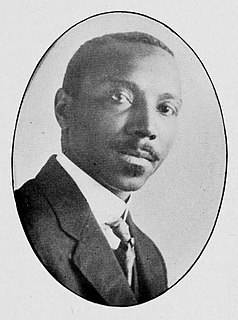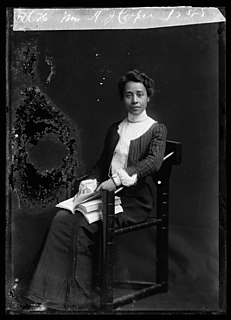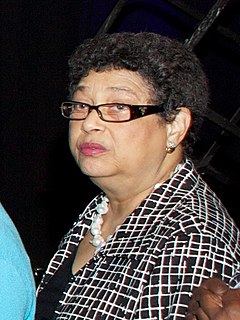
Tuskegee University is a private, historically black land-grant university in Tuskegee, Alabama. The campus is designated as the Tuskegee Institute National Historic Site by the National Park Service. The university was home to scientist George Washington Carver and to World War II's Tuskegee Airmen.

Thomas Wyatt Turner was an American civil rights activist, biologist and educator. He was the first Black American to receive a PhD in Botany, and helped found both the NAACP and the Federated Colored Catholics.
Historically black colleges and universities (HBCUs) are institutions of higher education in the United States that were established before the Civil Rights Act of 1964 with the intention of primarily serving the African-American community.. Most of these institutions were founded in the years after the American Civil War and are concentrated in the Southern United States. During the period of segregation prior to the Civil Rights Act, the great majority of institutions of higher education served predominantly white students, and disqualified or limited black American enrollment. For a century after the end of slavery in the United States in 1865, most colleges and universities in the Southern United States prohibited all African Americans from attending, while institutions in other parts of the country regularly employed quotas to limit admissions of Black people. HBCUs were established to provide opportunities to African Americans and are largely responsible for establishing and expanding the African-American middle class.

Sadie Tanner Mossell Alexander, was a pioneering Black professional and civil rights activist of the early-to-mid-Twentieth Century. Mossell Alexander was the first African-American to receive a Ph.D. in economics in the United States (1921). A few years later, she was first woman to receive a law degree from the University of Pennsylvania Law School (1927), becoming the first Black woman to practice law in Pennsylvania. She was also the first national president of Delta Sigma Theta sorority, serving from 1919 to 1923.

Anna Julia Haywood Cooper was an American author, educator, sociologist, speaker, Black liberation activist, and one of the most prominent African-American scholars in United States history.

Sue Bailey Thurman was an American author, lecturer, historian and civil rights activist. She was the first non-white student to earn a bachelor's degree in music from Oberlin College, Ohio. She briefly taught at the Hampton Institute in Virginia, before becoming involved in international work with the YWCA in 1930. During a six-month trip through Asia in the mid-1930s, Thurman became the first African-American woman to have an audience with Mahatma Gandhi. The meeting with Gandhi inspired Thurman and her husband, theologian Howard Thurman, to promote non-violent resistance as a means of creating social change, bringing it to the attention of a young preacher, Martin Luther King Jr. While they did not actively protest during the Civil Rights Movement, they served as spiritual counselors to many on the front lines, and helped establish the first interracial, non-denominational church in the United States.
Fatimah Linda Collier Jackson is an American biologist and anthropologist. She is a Professor of Biology at Howard University and Director of its Cobb Research Laboratory.

Vernie Merze Tate was a professor, scholar and expert on United States diplomacy. She was the first African-American graduate of Western Michigan Teachers College, first African-American woman to attend the University of Oxford, first African-American woman to earn a Ph.D. in government and international relations from Harvard University, as well as one of the first two female members to join the Department of History at Howard University.

Martin David Jenkins, was an American educator and researcher known for his work challenging theories of race and intelligence.
In the early colonial history of the United States, higher education was designed for men only. Since the 1800s, women's positions and opportunities in the educational sphere have increased. Since the late 1970s and early 1980s, women have surpassed men in number of bachelor's degrees and master's degrees conferred annually in the United States and women have continuously been the growing majority ever since, with men comprising a continuously lower minority in earning either degree. The same asymmetry has occurred with Doctorate degrees since 2005 with women being the continuously growing majority and men a continuously lower minority.
The civil rights movement (1865–1896) aimed to eliminate racial discrimination against African Americans, improve their educational and employment opportunities, and establish their electoral power, just after the abolition of slavery in the United States. The period from 1865 to 1895 saw a tremendous change in the fortunes of the black community following the elimination of slavery in the South.

Christine Darden is an American mathematician, data analyst, and aeronautical engineer who devoted much of her 40-year career in aerodynamics at NASA to researching supersonic flight and sonic booms. She had an M.S. in mathematics and had been teaching at Virginia State University before starting to work at the Langley Research Center in 1967. She earned a PhD in engineering at George Washington University in 1983 and has published numerous articles in her field. She was the first African-American woman at NASA's Langley Research Center to be promoted into the Senior Executive Service, the top rank in the federal civil service.

The Peace Movement of Ethiopia was an African-American organization based in Chicago, Illinois. It was active in the 1930s and 1940s, and promoted the repatriation of African Americans to the African continent, especially Liberia. They were affiliated with the Black Dragon Society.

Cecile Hoover Edwards was an American nutritional researcher whose career focused on improving the nutrition and well-being of disadvantaged people. Her scientific focus was on finding low-cost foods with an optimal amino acid composition, with a special interest in methionine metabolism. She was also a university administrator, serving as dean of several schools within Howard University between 1974 and 1990.

Wilhelmina Marguerita Crosson was an educator and school administrator known for her innovative teaching methods. One of the first African-American female schoolteachers in Boston, she developed the city's first remedial reading program in 1935, and was an early advocate of black history education.

Milicent Louise Hathaway was an American nutritionist and physiological chemist best known for her research on human metabolism. She taught for several colleges from 1930 to 1966 and worked for the U.S. Department of Agriculture in the postwar period.
Ruth Clement Bond was an African-American educator, civic leader and artist. As an educator, Bond taught at universities in Haiti, Liberia and Malawi. She headed the African-American Women's Association and in the course of her career advocated for women and children in the USA, Afghanistan, the Ivory Coast, Senegal, Sierra Leone, Togo and Tunisia. As an artist, Ruth is notable for elevating the utilitarian quilt into an avant-garde work of social commentary. Three such quilts remain from this creative period in the 1930s. Those quilts were exhibited at the Museum of Arts and Design in New York and the Michigan State University Museum.

Dorothy Cowser Yancy is an American academic, professor, and administrator. Her contributions to academia established her legacy of scholarship among African-American women. During college, Yancy participated in civil rights organizations, earned several degrees, including a Ph.D. in political science, and completed the Fulbright Program. She went on to teach at the School of Social Sciences at Georgia Institute of Technology, becoming the first African-American to become a tenured full professor. She left Georgia Tech in 1994 to become the president of Johnson C. Smith University, in Charlotte, North Carolina. In 2009, Yancy became the 14th president of Shaw University and was elected to the position again in 2011 as the 16th president. She received many awards and honors for her dedication to higher education.
Marian L. Palmer Capps was an American mathematician who became a professor at Norfolk State University and president of the Women's Auxiliary to the National Medical Association.













